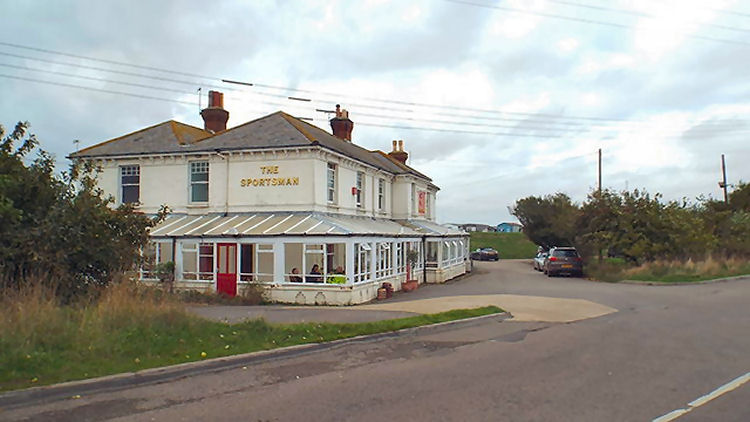|
Faversham Road
Seasalter
01227 273370
http://www.thesportsmanseasalter.co.uk/
https://whatpub.com/sportsman
|
|
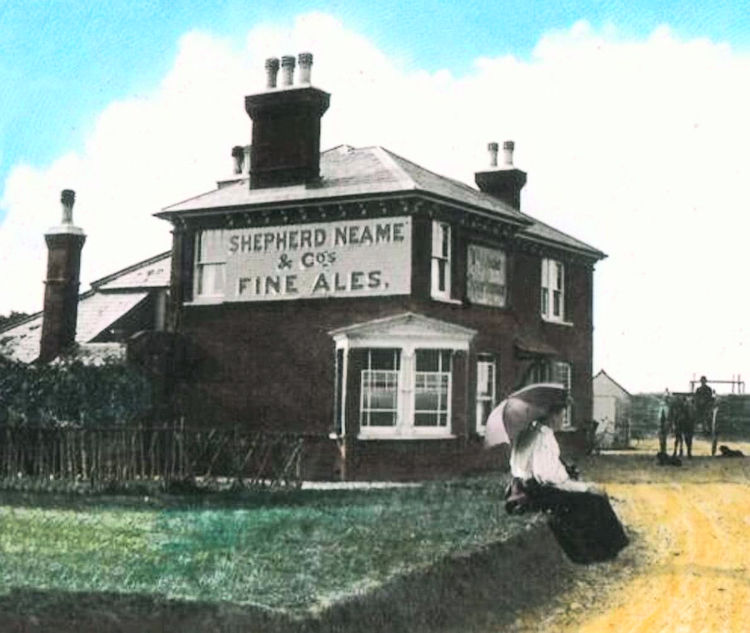
Above colourised photo, date unknown. |
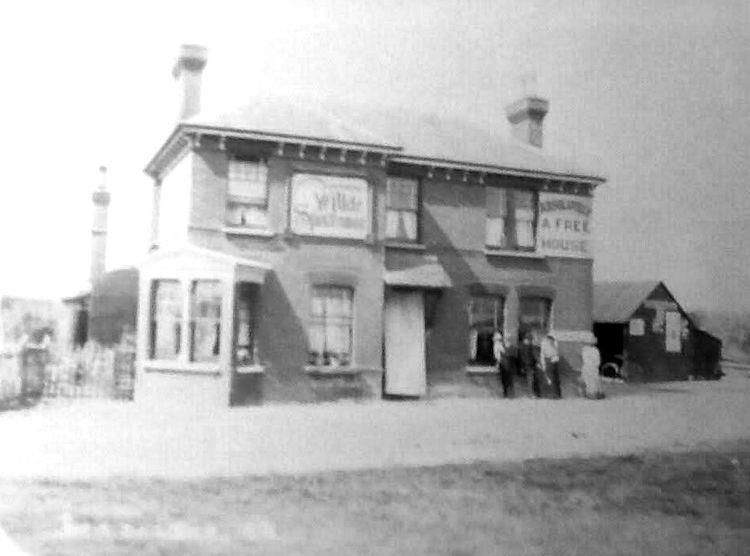
Above photo, date unknown. |

Above postcard, date unknown. |
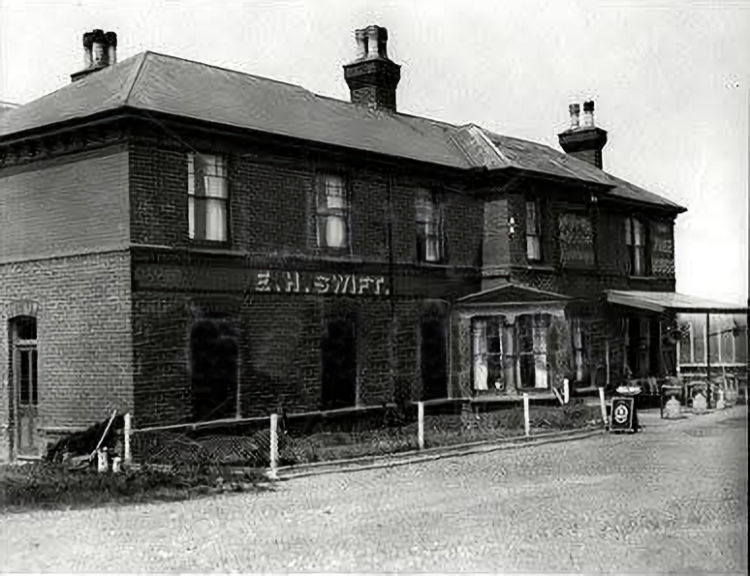
Above photo, date unknown. |
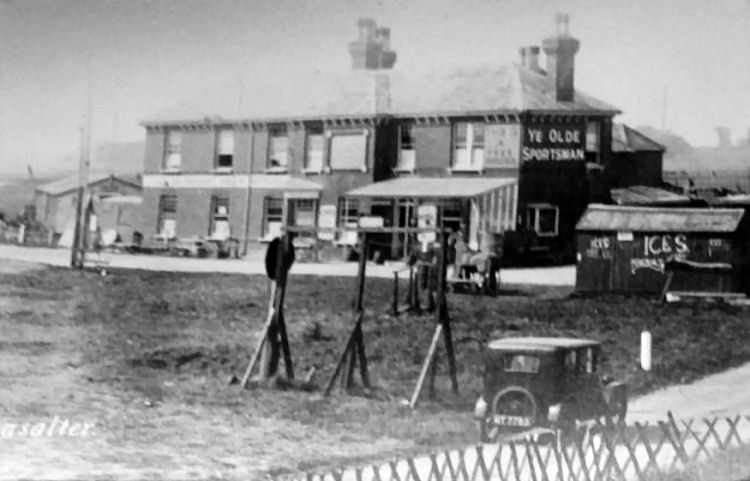
Above photo, circa 1920, kindly sent by Rory Kehoe. |
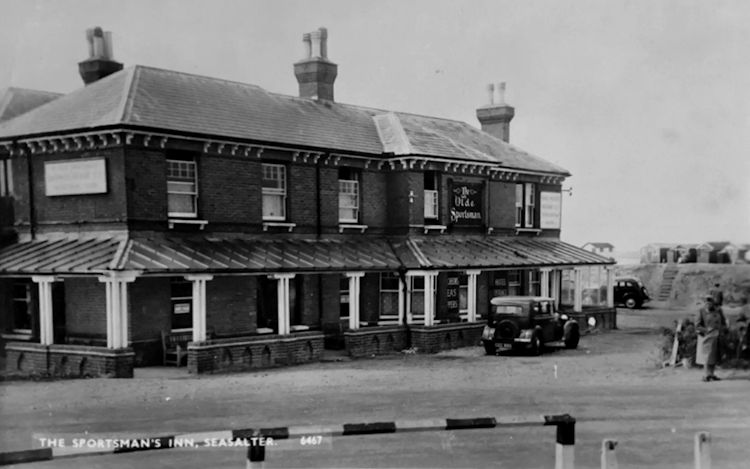
Above postcard, circa 1926, kindly sent by Rory Kehoe. |

Above postcard, circa 1926, kindly sent by Rory Kehoe. |
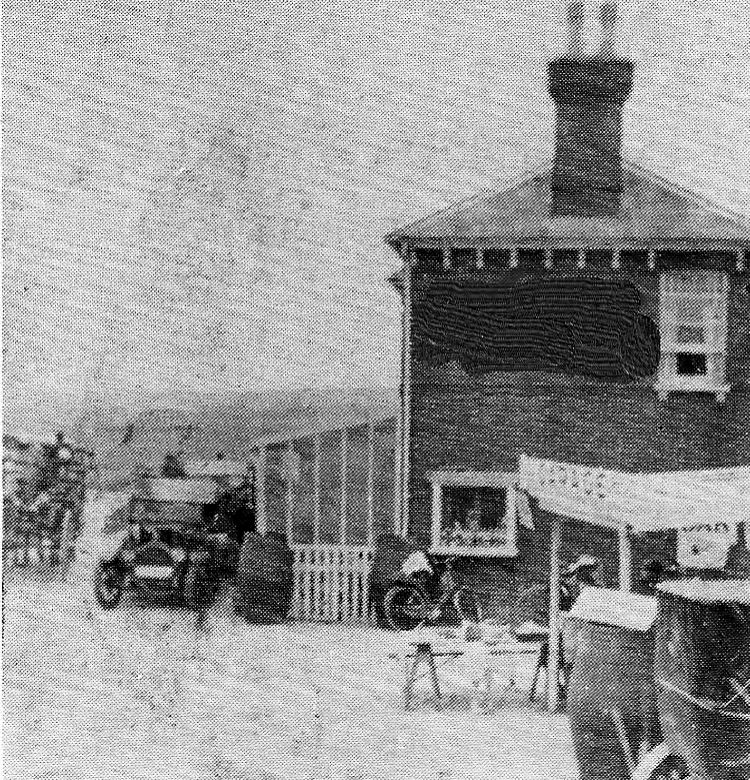
Above photo, date unknown, with sign redacted on photo for some reason. |
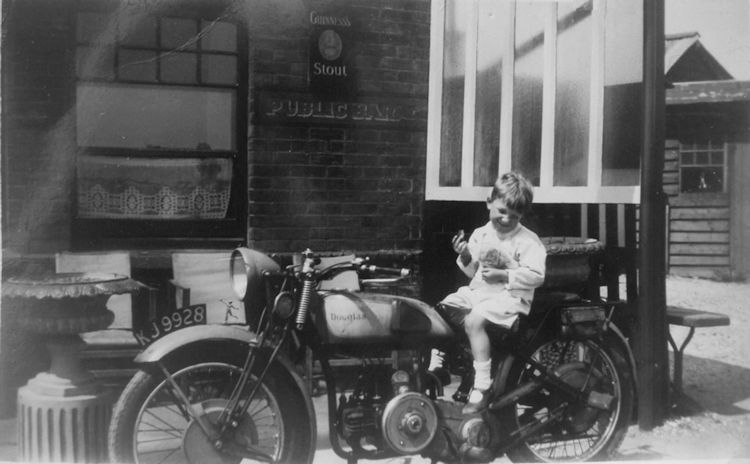
Above photo, circa 1935, kindly sent by Rory Kehoe. Sadly, the identity
of the young lad isn't known but he's astride a classic interwar British
motorcycle: a Douglas L3 350cc side valve.
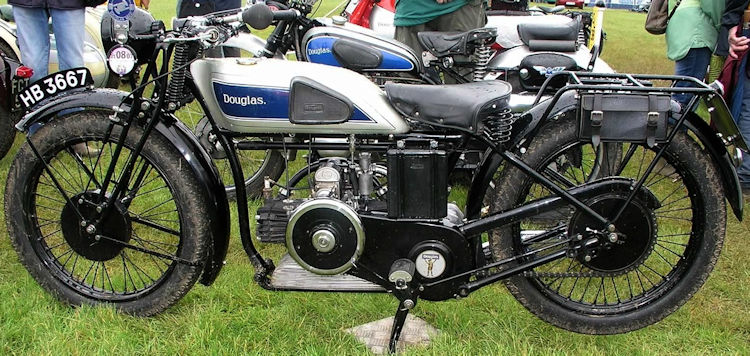
Above showing one thanks to James Hewing of the National
Motorcycle Museum, of a Douglas L3 in all its restored 1930s' glory. At
the time the original photograph was taken, a new Douglas L3 would have
set you back £35.10s which was about two months' average wages in the
mid-1930s. |
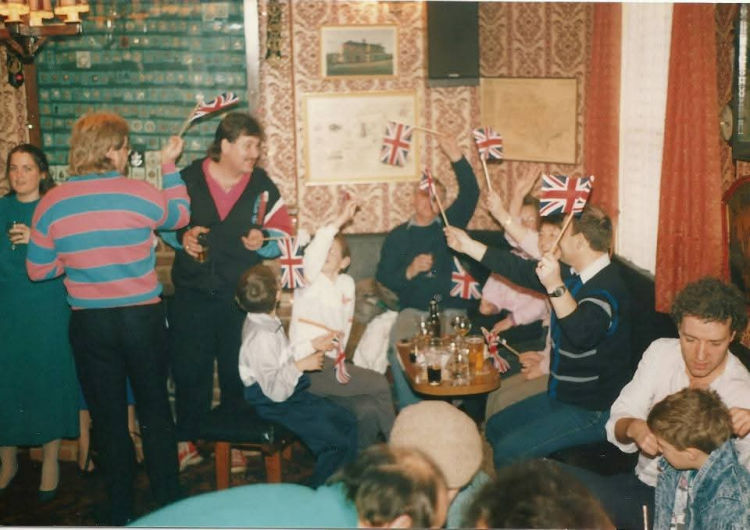
Above photo, date unknown showing a closing time on Sunday when they all
sang Land of Hope and Glory. |
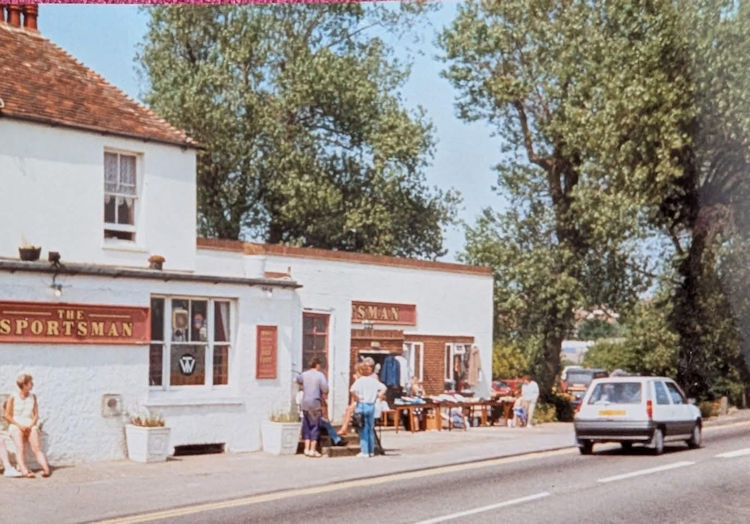
Above photo circa 1990. |

Photos taken in September, 2011 from
http://www.flickr.com
by Ewan Munrow.
|
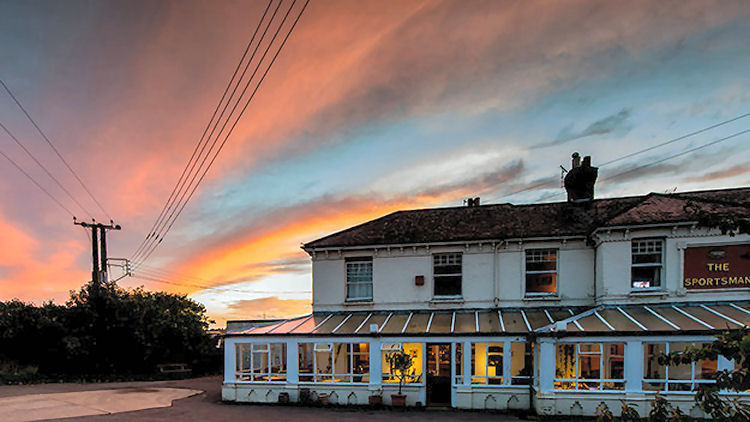
Above photo 2015. |
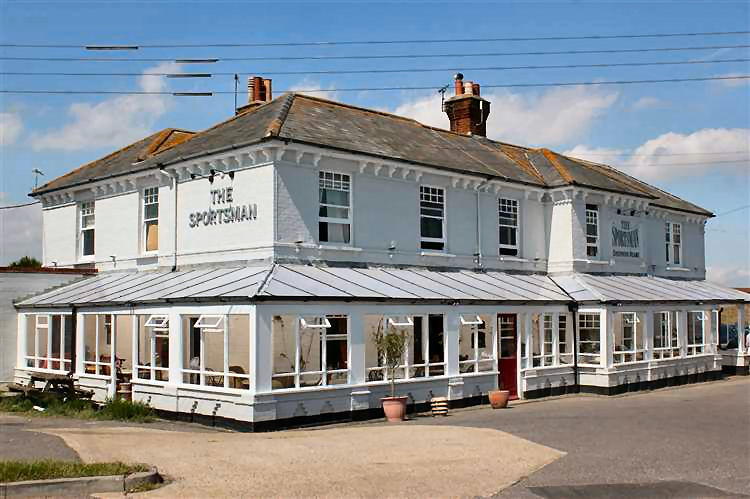
Above photo, 2019. |
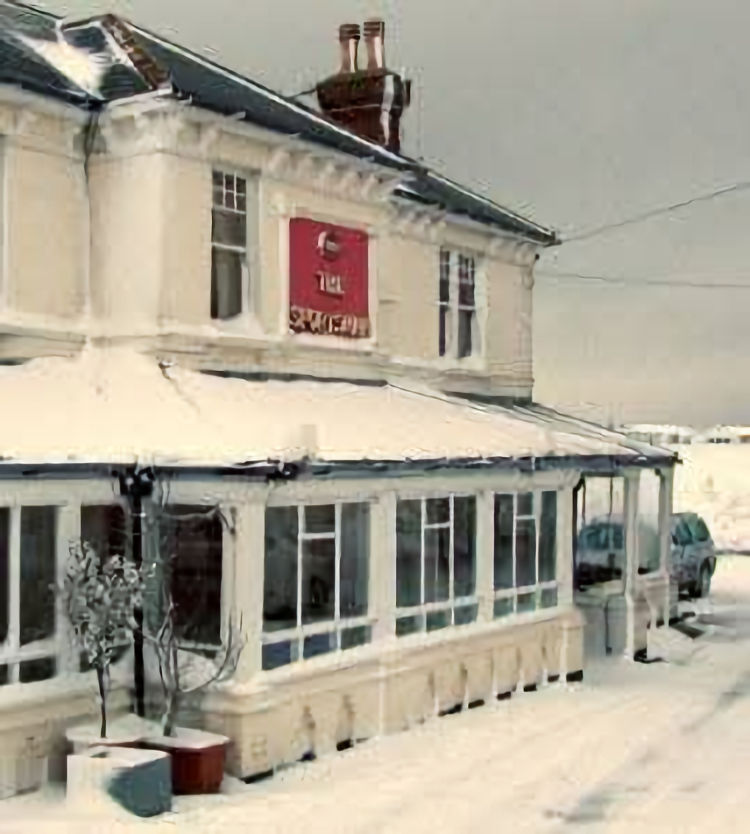
Above photo, date unknown. |
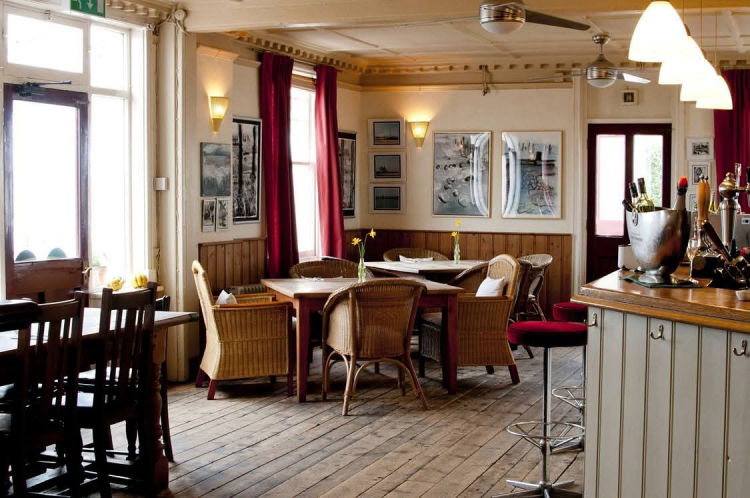
Above photo, date unknown. |
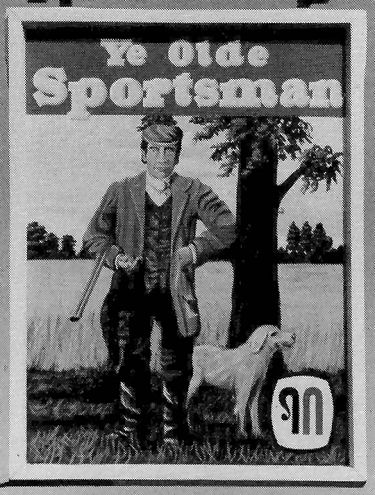 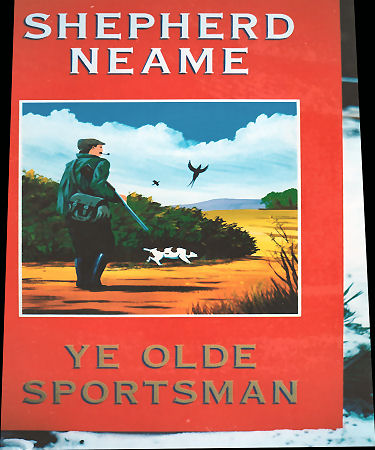
Above sign left, 1987, sign right, January 1994.
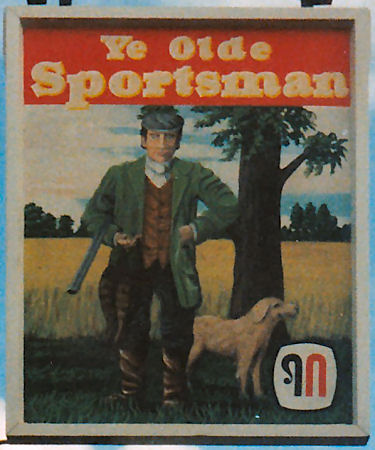 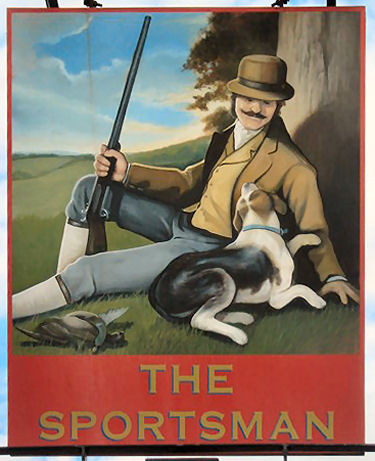
Above sign left, April 1986, sign right, 2010.
With thanks from Brian Curtis
www.innsignsociety.com. |
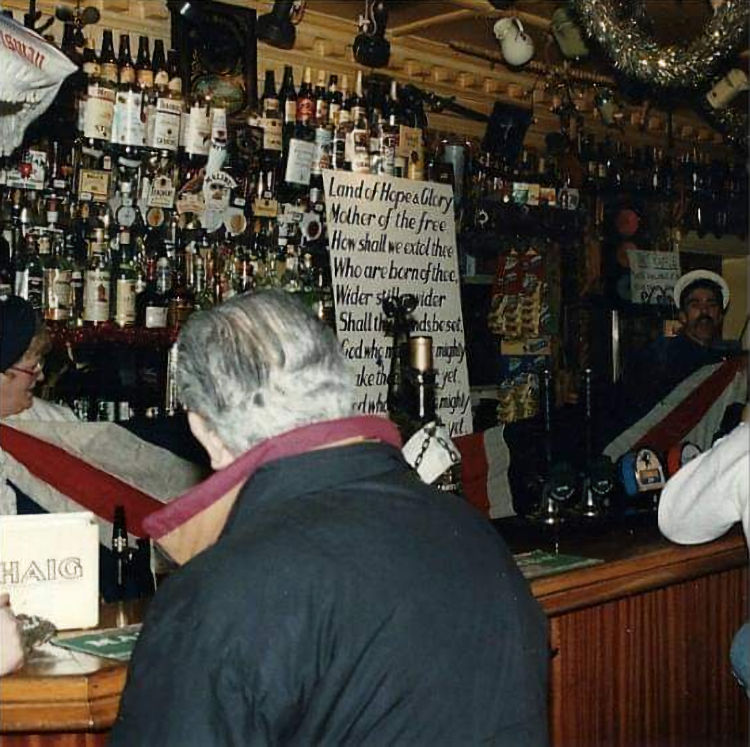
Above photo circa 1980s, where the licensee would shut up the pub on a
Sunday at 2pm, bring out the flags and sing "Land of Hope and Glory." |
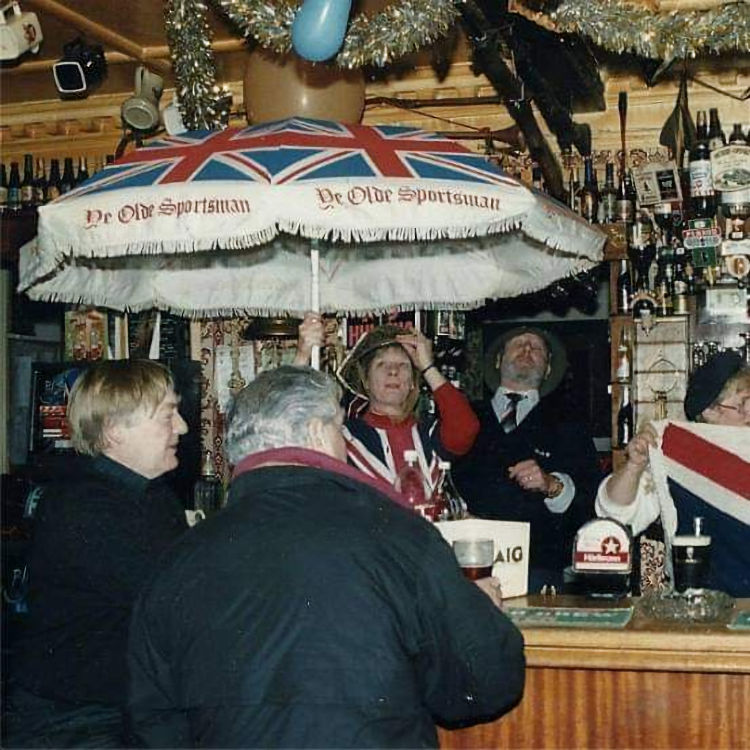
Above photo circa 1980s. |
I have also seen this addressed as Graveney.
The first evidence of an inn at the site of the "Sportsman" dates back to
1642. However, the surrounding area of Seasalter was entered in the Domesday
book as belonging to the kitchens of Canterbury cathedral. Even then it was
an area of food production supplying produce for the influx of religious
tourists after the murder of Thomas Beckett in 1170.
By 1920 this was called "Ye Olde Sportsman" but it appears to have
changed back again to its simpler name of "Sportsman" by 2010.
|
Whitstable Times and Herne Bay Herald, Saturday 31 May 1873.
Graveney Suicide by Hanging.
A case of suicide was discovered in this parish on Saturday morning last.
John Knowler, 65 years of age, who has of late lodged at the "Sportsmans
Arms," Seasalter, paid a visit to his son, Thomas Knowler, at Graveley, on
Friday evening, leaving about 8 o'clock, as was thought, to return to his
lodging.
On Saturday morning at about 7:30, Thomas Knowler went into his stable and
there found his father hanging by a rope used for the purpose of pulling up
pigs. He was quite dead, and appeared to have been so for some time. The
deceased once before attempted self-destruction in a similar manner, and was
cut down by his daughter. He has also been in a lunatic asylum.
|
|
Canterbury Journal, Kentish Times and Farmers' Gazette. Saturday 19 November 1898.
The Seasalter Weirs. A Curious Point.
George Jasper Newson v. George Youens.
Plaintive, who is landlord of the "Sportsmans Inn," Seasalter, sued
defendant, a cockeller, of 1, Marine Cottages, Sheerness, for £2 8s. 9d.,
the value of cockles wrongfully taken from ground which plaintive hires at
Seasalter. The plaintiff was not legally represented, but Mr. D. Blome-Jones,
of Sheerness, appeared for the defendant.
Plaintiff stated that his claim was for six and a half loads of cockles,
which defendant took in the month of September. The price was 7s. 6d. a
load. Youens had dealt with him for some time, but suddenly he refused, on
some ground or another, to pay for what he owed.
His Honour:- Why are you not legally represented?
Plaintive said he thought his case was clear enough, and, besides, he could
not afford to pay for legal advice. He claimed a right to sell the cockles,
as he held certain land within fishing rights under Earl Sonds, the Lord of
the Manor. He agreed to let the defendant have the cockles at 7s. 6d. a
load, and he promised to play in a fortnight's time. He had not done so on
the ground, he (plaintiff) believed, that cockles were "wild fish."
His Honour:- Most fish are wild, are they not? (Laughter.)
Plaintive produced his agreement for hiring the land which his honour
perused.
Cross-examined by Mr. Blome-Jones. The extent of ground which his agreement
covered was about to 280 acres. He had a right to all the fish there. The
agreement did not simply mean the ground round the weirs but from the top of
the bank to low water mark. The land he hired was not bouyed but marked with
a wire fence on the bank. A man named Cork paid him £10 a year for the
cockles on the ground. Sometimes Cork collected money for cockles which was
sold, and they shared the proceeds. Cork never collected for himself. He
(witness) had warned the defendant not to come on his grounds again for
cockles, but only the previous Sunday he was there in a boat getting
cockles.
Mr. Blome-Jones said the present action was only brought in order to prove
who really was entitled to receive the money for the cockles. He understood
that the man Cork also claimed the right to charge for the cockles as well
as plaintive. That was the first time he had seen the agreement between Earl
Sondes and Newson, and if his Honour held that plaintiff was entitled to the
fish on the grounds which extended a distance of 2 miles from the weirs it
was of no use fighting the case further.
His Honour asked if anyone represented the Lord of the Manor. They now saw
the need plaintiff had of legal advice on the subject.
The Deputy Registrar stated that Earl Sondes' agent had informed him that if
any question arose as to his lordships rights he should like to be legally
represented.
Mr. Richard Griggs, managing clerk to Mr. F. Name, Lord Sondes' agent, was
then sworn, and in answer to his honour he said Earl Sondes was Lord of the
Manor of Graveney, and he claimed the usual manorial rights which consisted
of the collection of quit rents.
His Honour:- How does he claim the fishing rights?
Mr. Griggs replied that from time immemorial the family had collected the
rent's, and he supposed that gave Earl Sondes the right to let the fishery.
His Honour:- Can you claim the rights of fishery against Her Majesty's
Subjects?
Mr. Greggs:- Yes, as Lord of the Manor.
His Honour:- The question is - what right has the Lord of the Manor to the
fishery?
Mr. Griggs:- The right to let a portion of the Manor, which includes the
fishery.
His Honour:- This is a matter of importace not only to Earl Sondes, but to
the public generally.
Mr. Blome-Jones said he was quite prepared to admit that plaintiff had a
right to the fish caught in the weirs, because they were fenced off, but was
he entitled to two miles off ground? The agreement said he had the privilege
to fish on the ground, but not the exclusive privilege of so doing. The
grounds will let the £10 a year, and from what he understood they were worth
to the plaintiff considerably over £300.
His Honour:- What does Lord Sondes claim?
Mr. Greggs:- He claims the right to let the fishery. If there is any
question as to his Lordships rights he would like to be legally represented.
Mr. Blome-Jones said the defendant wished plaintiff to prove his right to
receive money for the cockles.
Mr. Griggs produced the Act of Parliament with regard to the Faversham
oyster fishery, but in answer to his Honour said he knew of no Act of
Parliament regulating the Manor of Graveney.
Defendant was then called and stated that for some time past he had had
cockles from Seasalter, but he made arrangements with a man named Cork at
first to take 16 bushels for 6s. 6d. Sometimes he paid Cork, sometimes the
plaintiff or his sons. On one occasion in September he had no money, and he
asked plaintive if he would let him go to work and pay for the cockles next
time he came. Mr. Newson replied "Yes," and he went to work. Meanwhile Cork
came to him and said the next time he came without money he would not be
allowed to have any cockles. He was landlord and he could show him
(defendants) the deeds. Both Cork and Newson had applied to him for the
money, and he really did not know which one to pay.
William Cork, fish hawker, of High Street St. Gregory's Canterbury, who is
very deaf, stated that he paid Mr. Newson £10 a year for the winkles,
cockles, and muscles on the ground, and that he and plaintiff shared the
proceeds.
Plaintiff, re-called, bore out Cork's statements with regard to the sharing
of the money. and his Honour joined Cork as a plaintiff with Newson.
His Honour, in giving judgement for the amount claimed, said he could not
decide that day, in the absence of Earl Sondes, whether his lordship had any
right or not. It was an exceedingly difficult question to establish a right
to a fishery, especially in navigable waters. It was a matter rather for the
High Court to decide than for him. The difficulty had arisen through two
persons claiming from defendant, money for the cockles. As Cork had
consented, as a partner, to be joined when Newson as plaintiff in the
action, he would give judgement for the amount claimed, but under the
circumstances he would allow no costs.
|
|
The Scotsman, Thursday 16 June 1932.
WOOD TRADEGY.
Inquest opened on three victims.
Soldier remanded.
The inquest was opened at Ashford Hospital, Kent, yesterday, on the two
women and a girl whose bodies were found on Monday in King's Wood, Challock,
Ashford. They were Mrs. Janie Swift, aged about 65, of "Old Sportsman's
Inn," Seasalter, near Whitstable, Kent, Mrs. Janie Tremayne Stemp, age 35,
of the "White Hart Inn," Wadhurst, Sussex, Mrs. Swift's daughter, and Peggy
Stemp, age 13, Mrs. Stemp's daughter.
Mr. Swift and Mr. Stemp, the two husbands, sat side by side at the back of
the court.
The Coroner, Mr. Rutley Mowll, addressing the jury, said:- "You are called
upon to take part in three inquests relating to the same set of
circumstances. Today you will have brought before you evidence of
identification. On Friday of next week we shall meet again for you to
receive medical evidence as to the cause of death of each of these persons.
I should tell you that by the Coroner's Amendment Act, 1926, the scope of
the enquiry of the Coroner's Court is limited in this particular case,
because I have had a notice from the clerk to the magistrates informing me
that a person has been charged before examining Justice's with a murder of
these persons."
In these circumstances, the coroner added, he proposed to adjourn the
inquest until after the conclusion of the criminal proceedings, except with
regard to the actual cause of death, about which evidence will be given at
the adjourned hearing on Friday of next week.
JURY VIEW THE BODIES.
The Coroner with the jury and a police officer then went to view the three
bodies which were lying side by side in the mortuary. A minute or two after
the Coroner and the jury had left the Court to view the bodies, Mr. Swift
rose from his seat from the back of the Court and followed them to the
mortuary. When he returned he was visibly affected and sobbed during the
evidence.
The Coroner asked who would identify the three bodies and was told that a
Mr. Codden would do so.
The Coroner:— Is he a relation?
Detective-Superintendent Avory:— No sir.
Are you satisfied with that?:— Yes, he is a very great friend of the
families.
Mr. James Godden, an undertaker, of Durgates, Wadhurst, Sussex, was then
called. He first identified Mrs. Janie Tremayne Swift. He said she lived at
"Ye Olde Sportsman’s Hotel," Seasalter, near Whitstable, and was the wife of
Edward Swift, licensed victualler. He last saw her alive about mid-day on
Monday. She was in a motor car at Wadhurst.
The Coroner:— Who was driving the car?
Mrs. Stemp.
Was there anybody else in the car?:— Mrs. Stemp's daughter was inside the
car.
Mr. Codden also identified the bodies of Mrs. Stemp and her daughter. He
said that Mrs. Stemp was the wife of Thomas Stemp, the licensed victualler
of the "White Hart Hotel," Wadhurst. Peggy was a schoolgirl. In each case he
saw them for the last time at the same time as he had previously mentioned,
on Monday.
Superintendent Robertson told the Coroner that he would prefer to attend the
next hearing at the Police Court, and the jury were directed to attend
there.
POLICE COURT PROCEEDINGS.
Earlier in the day James Thomas Collins (26), described as a private in the
2nd Battalion the Buffs, East Kent Regiment, stationed at Shorncliffe, made
a four minutes’ appearance at Ashford Police Court, charged with the wilful
murder of the two women and the girl. The wording of the charge relating to
Mrs. Swift was as follows:— “That you feloniously, wilfully, and of your
malice aforethought did kill and murder one Janie Swift by shooting her with
a rifle at Wye on June 13, 1952.”
The wording of the other two charges was similar, with the exception of the
names.
The only witness was Superintendent W. J. Robertson, of Kent County
Constabulary, who stated that he saw Collins detained at Barnet Police
Station on Tuesday and took him to Ashford , where he cautioned him and
charged him with the murder of Mrs. Swift, Mrs. Stemp, and Peggy Stemp.
Collins was remanded until Wednesday next.
|
|
Aberdeen Press and Journal. Wednesday 29 June 1932.
Soldier committed for trial.
Charge with triple murder at Ashford.
James Thomas Collins (26), private of the Buffs, East Kent Regiment, was
committed for trial at Ashford yesterday, charged with the murder of two
young two women and a girl, whose bodies were found in King's Wood, Challock,
near Ashford, on June 13.
Collins pleaded not guilty, and reserved his defence.
The victims, who it is alleged was shot by Collins with a rifle at Wye,
were:-
Mrs. Janie Tremayne Swift (69), the "Old sportsman Inn," Seasalter, near
Whitstable; her daughter, Mrs. Janie Swift (35,) "White Hart Inn," Wadhurst, Sussex, and
Mrs. Stemp's 13 year old daughter Peggy.
Divisional Detective Inspector Ockey, despite objection by Mr. Levy,
defending, gave details of Collin's career.
|
|
Yorkshire Post and Leeds Intelligencer. Saturday 26 November 1932.
THREE MURDERS BY SOLDIER.
Verdict of "Guilty But Insane.
Praise for police.
James Thomas Collins (26), a private in the 2nd Battalion the Buffs (East
Kent Regiment), stationed at Shorncliffe, near Folkestone, was found "Guilty
but Insane" at Kent Assizes yesterday when he was accused of the murder of
Mrs, Janie Tremayne Swift (69), of the "Old Sportsman Inn," Seasalter,
Whitstable, Mrs. Janie Tremayne Stemp (35), of the "White Hart Inn,"
Wadhurst, Sussex, her daughter, and Peggy Stemp (13), daughter of Mrs. Stemp.
The bodies of the two women and the girl was found in King's Wood, Challock,
near Ashford, on June 13 last. They had been shot.
Sir Gervais Rentoul, K.C., who appeared for the prosecution, said on June
13th the women and girls were in an open sports car travelling to Mrs.
Swift's home at Whitstable. They would pass on the Ashford-Faversham main
road a place called King's Wood Hill, and here in a wood at the side of the
road the three were discovered later in the day murdered.
He hoped to show that Collins was certainly in the near vicinity shortly
before the crime was committed. He was spoken to or seen during that morning
by at least 3 people. He was seen later in the afternoon in a car of the
same colour and description as that which was driven by Mrs. Stemp.
Seen by lorry driver.
At 1 a.m. on June 14th, Police Constable Chapman, who was stationed at
Barnet, was on duty in the neighborhood of Potter's Bar when he saw Collins
standing at the corner of the road. P.C. Chapman noticed that there was
something on his shoulder. His suspicions were raised, and he challenged
him, asking him what he was carrying.
Collins took the object from his shoulder, undid the covering and revealed a
rifle. This he immediately pointed at the constables chest, saying. "Stand
there or I will shoot you dead."
The constable tried to keep him in conversation, and if possible to distract
his attention. "He undoubtedly behaved with exceptional courage," said Sir
Gervais.
Finally Collins backed away still threatening to shoot the Constable, who at
last was able to mount his cycle and pretend to ride off. He, however,
continue to follow Collins, and finally got the assistance.
Overpowered by police.
Later the same morning, added Sir Gervais, the police were able to surround
a field where Collins was and to overpower him. Just before he was seized he
deliberately emptied the magazine of the gun by firing several shots into
the air.
Evidence of Collins's mental instability was given, and it was stated that
from childhood he had been fascinated by firearms.
The jury, after a retirement of 15 minutes, returned a verdict of "Guilty
but Insane," and Mr. Justice Hawke ordered Collins to be detained during His
Majesty's pleasure.
The jury said that they wanted to commend Police Constable Chapman for his
very plucky act.
Mr. Justice Hawke: I was going to say the same myself. It is one of the most
courageous things I've ever heard.
Mr. Justice Hawke also commended the officers who assisted in the arrest of
Collins. They knew by that time, he said, that he was supposed to have taken
three lives, and that he had a rifle and was suspected of having cartridges.
"It is very satisfactory to know that we can rely upon the police in this
way," said the judge.
|
|
Whitstable Times and Herne Bay Herald. Saturday 10 January 1942.
Death Fessenden.
On 4th January, 1942, at the Kent and Canterbury Hospital. William Nelson Fessenden, age 56, of the "Old Sportsman Inn," Seasalter, dearly beloved
husband of Arlene Ann and eldest son of the late Charles C. and Mrs.
Fessenden, of Montreal, Canada. Cremation at Charing, Kent, at 1 p.m. today
(Friday). No flowers or mourning by request.
|
|
From the Whitstable Times, 12 February, 1944.
Licensed Houses in St. Augustine’s Division.
The Chairman (Mr. W. Colthup) congratulated all the licensees. All licences
were renewed with the exception of the "Red Lion," Sturry (demolished by
enemy action) and the "Sportsman," Seasalter.
|
|
Whitstable Times and Herne Bay Herald 11 February 1950.
ROUGH WEATHER DOES DAMAGE. SPORTSMAN PUBLIC HOUSE FLOODED.
February opened with torrential rains and high winds, the country around
Whitstable being particularly affected. Graveney marshes were flooded, due
both to rain settling on the flat land and to the dykes themselves
overflowing, and farm land in the Dargate area was under water. On Thursday
morning in last week buses ploughed through several inches of water and
residents had to use all available gum boots.
Once again the "Sportsman" public house was affected, the floors of the bars
being under water, and for some twenty-four hours customers entered and left
by walking along garden seats which the licensee, Mr. Smith, had placed in
the doorway to serve as a "gangplank" over the deep ponds of water.
The high wind on Thursday evening fetched down a tree at Syndale Park, which
crashed across the London Road near Gambell's garage. For a time the road
was blocked to traffic and County Council workmen worked until 11.15 p.m.
removing the tree. The same evening a tree came down in Park Road, opposite
William Street, and broke the window of a house in the first named street.
|
|
Whitstable Times and Herne Bay Herald, Friday 16
September 1983
Death of former publican.
Mr. Brian Martin, former landlord of the "Sportsman" public house
at Seasalter died in Whitstable and Tankerton Hospital on Wednesday.
He was 45.
He had been at the "Sportsman" since 1959, when his parents took
over the licence. He became landlord following their deaths and he
stayed at the pub until he had to retire through ill-health this
summer.
He leaves a widow, Pat and children Gary and Hayley.
|
|
From
http://www.pillbox-study-group.org.uk/ accessed 2024. Kent battle between German
bomber crew and British soldiers marked after 70 years.
A little-known skirmish between a downed German bomber crew and a
group of British soldiers, the last ever military conflict to take
place on British soil, is finally being marked 70 years after the
event. Most history books have Bonny Prince Charlie's 1746 defeat at
Culloden as the final battle to occur in this country. But the
virtually unheard of Battle of Graveney Marsh in the Kent
countryside 194 years later was actually the last action involving a
foreign enemy.
The battle took place on September 27 1940 between the crew of a
downed German bomber and a company of British soldiers who had been
holed up in a pub. Members of the London Irish Rifles were billeted
at the "Sportsman Inn" in the coastal hamlet of Seasalter when the
stricken Junkers 88 plane came down on Graveney Marsh. Although the
soldiers armed themselves, they fully expected the four-strong
Luftwaffe crew to give themselves up without a fight. They were
wrong. As they approached the plane, the Germans opened fire with a
machine gun. The British servicemen hit the deck and returned fire,
while a smaller group crawled along a dyke to get within 50 yards of
the plane before they too started shooting.
There was a heavy exchange of fire before the Germans surrendered,
with one of them being shot in the foot during the brief battle.
Nobody was killed. In a dramatic twist, commanding officer Captain
John Cantopher overheard one of the captured crew mention in German
that the plane should "go up" at any moment. With that, he dashed
back to the aircraft, located an explosive charge under one of the
wings and threw it into a dyke, saving the prized aircraft for
British engineers to examine. Incredibly, the British even had a
pint of beer with the German airmen back at the pub before the POW's
were picked up. Now for the first time the Battle of Graveney Marsh
will be officially remembered by a military organisation.
Next month, the London Irish Rifles Regimental Association will mark
its 70th anniversary by unveiling a commemorative plaque at the pub
which is still standing today. Nigel Wilkinson, vice-chairman of the
association, said: "Although it barely gets a mention in the history
books Graveney Marsh was the last battle to take place on British
soil involving a foreign enemy". At the time the aircraft was found
to be a new marque and as it was only two weeks old it provided the
Air Ministry with valuable intelligence. "Of course, the men of the
London Irish Rifles spoke about the battle and for a time it went
down in folklore within the regiment. "But it seems to have been
forgotten about.
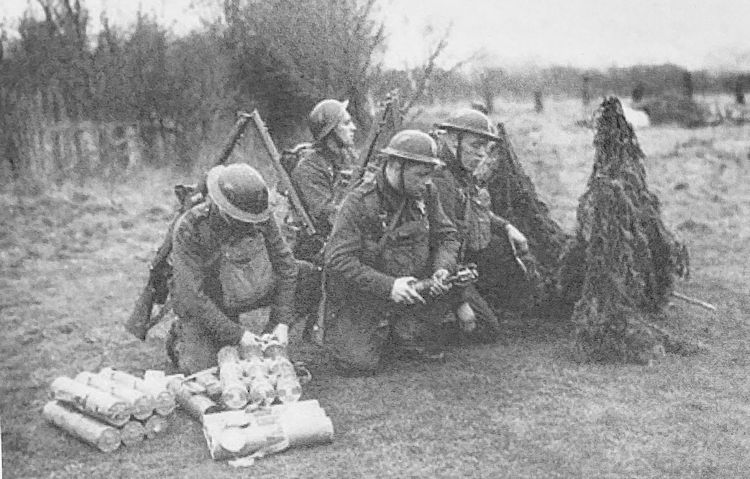
Photo: London Irish Regt training on Graveney Marsh in 1940 Photo:
BNPS.
The soldiers were billeted at the "Sportsman, and the pub is still
standing today, we thought a plaque that will serve as a permanent
reminder was appropriate." In the summer of 1940, the 1st Battalion
London Irish Rifles was sent to Kent and deployed on coastal defence
duties following the Dunkirk evacuation. As the threat of invasion
by the Germans eased, their task changed to capturing any enemy
aircrew brought down in the Kent countryside.
On September 27 a Junkers 88 bomber was attacked by two Spitfires
over Faversham following a raid on London. One of its engines had
already been knocked out by anti-aircraft fire when the second was
put out of action by the Spitfires. The pilot, Unteroffizer Fritz
Ruhlandt, crash landed on Graveney Marsh, which was seen by elements
of A Company who were in the pub. According to the regiment's
official records, Capt. Cantopher then arrived at the hostelry to
inspect the men. The record states that Sergeant Allworth explained
he had sent the men to the downed aircraft. It reads: '"They took
arms I hope,' Cantopher said. 'No sir...' The sergeant broke off.
Sounds of machine gun fire could be heard. 'It looks as if they
should have done,' commented Cantopher. 'Forget the inspection, I am
going over there. Bring some of your men with rifles and ammo.'" Mr
Wilkinson said: "On approaching the aircraft the men were fired on
by the German crew with the aircraft's two machine guns. "The London
Irishmen got into attack formation and having laid down heavy rifle
fire on the aircraft mounted an assault of the Junkers across the
marsh. "By now the enemy air crew had been wounded by the rifle fire
and decided to surrender".
It was at this stage that Captain Cantopher came on the scene. As
the prisoners were being taken away Cantopher heard one of them say
that 'the aircraft would go up anytime now'.
"He ran back to the Junkers and after a nerve-wracking search
located the device and disarmed it. Cantopher was awarded the George
Medal for his bravery." Corporal George Willis, 90, the regiment's
piper, was in the "Sportsman" when the men returned with the
Germans. George, from Greenwich, south east London, said: "The men
were in good spirits and came into the pub with the Germans. We gave
the Germans pints of beer in exchange for a few souvenirs. "I got a
set of enamel Luftwaffe wings." It is expected that 60 members of
the London Irish Rifles Regimental Association will attend the event
at Seasalter, near Whitstable, on Sunday, September 26th 2010.
There will be parade in front of the association's president, Major
General Corran Purdon, who won the Military Cross for the famous
raid on St Nazaire and was imprisoned in Colditz. There will then be
a drum head service before the unveiling of the plaque.
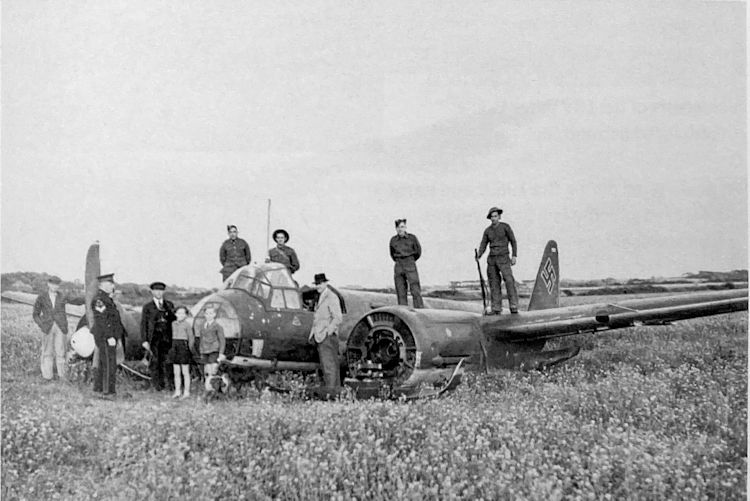
The Battle of Britain Troops and civilians pose with Junkers Ju
88A-1 (B3+BM) of 4./ KG 54, which belly-landed on Marsh Farm,
Earnley, Sussex, on the evening of 21 August 1940. It had been
intercepted by No. 17 Squadron Hurricanes during an attack on RAF
Brize Norton.
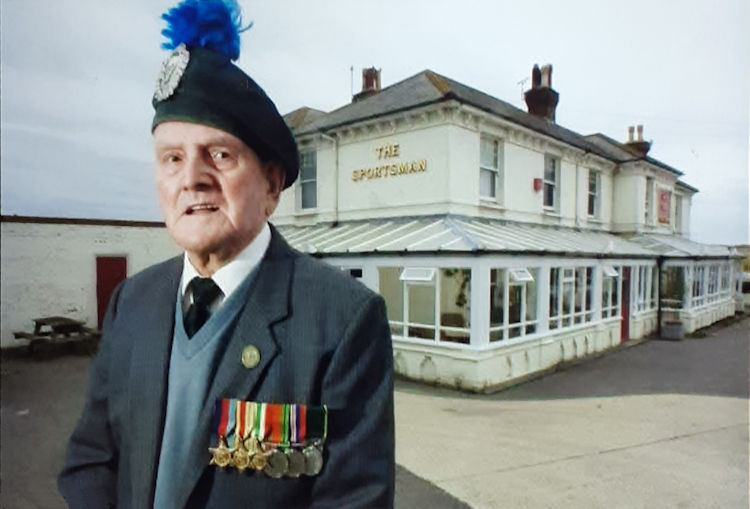
Above photo showing Corporal George Willis age 90. |
|
From the
https://www.kentonline.co.uk
By Chris Britcher, 1
February 2019. The Sportsman in Seasalter named winner of the Estrella Damm Top 50 Gastropub Awards.
A seaside eatery has been named the best gastropub in Britain for a fourth
year.
The Sportsman in Seasalter, near Whitstable, scooped the prize at the
Estrella Damm Top 50 Gastropubs Awards.
The Shepherd Neame-owned pub, run by brothers Stephen and Phil Harris,
picked up the title at an awards lunch on Monday, January 28, after
receiving the most votes in an industry poll organised by leading pub
industry magazine the Publican’s Morning Advertiser.Hundreds of votes were cast to determine the top 50 by industry experts
including food critics and writers, gastropub chefs and other food
influencers.
The Sportsman, which has held a Michelin star for 11 years, previously
topped the list in 2015, 2016 and 2018. It has been recognised with numerous
accolades in recent years, including winning first place in the 2017 UK
National Restaurant Awards.
Phil Harris said: “We are delighted that the hard work of our staff has been
recognised with this accolade. We asked two of our chefs, Joe McMahon and
Pete Cribbin, to attend the event on our behalf, as this is something to be
shared by the whole team. Their talent, dedication and passion for their
work is key to The Sportsman’s success.”
|
LICENSEE LIST
DUNK Thomas 1861+ (also businessman age 52 in 1861 ) )
DUNK William T 1874-82+ (also fisherman age 49 in 1881 ) )
BUSBRIDGE William 1891+ (age 66 in 1891 ) )
SWIFT E H ????
HOLLINGSWORTH Frederick William 1901-11+ (age 49 in 1911 ) )

STOREY G 1927-28+
FESSENDEN William Nelson 1938-39-Jan/42 (age 54 in 1939)
SMITH Mr 1950+
MARTIN Mr 1959+
MARTIN Brian (son) to Sept/1983 dec'd
???? 8/Nov/1999+
HARRIS Stephen & Phil 2019+
https://pubwiki.co.uk/Sportsman.shtml
 From the Kelly's Directory 1903 From the Kelly's Directory 1903
 Census Census
|













